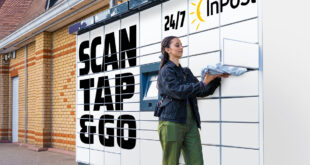Royal Mail today announced it has passed the milestone of 3,000 electric vehicles across its delivery and collection fleet. The roll-out includes many cities where low emission zones are in force, including London, Bristol, Glasgow, Cambridge and
The 3,000th electric vehicle was deployed at Peterborough Delivery Office, where Royal Mail CEO, Simon Thompson and MP for Peterborough, Paul Bristow, made a visit to see the see the fleet in operation. Peterborough Delivery Office currently has 106 vehicles on site with all delivery and collection functions operated by a fully electric fleet.
So far, 70 delivery offices across the country have made the transition to move to either full or part electric deliveries and collections. The first site that went live with an all-electric fleet was Bristol in June 2021 and the most recent go live with the expectation to achieve 100% electrification is Letchworth who started the journey in July 2022.
Simon Thompson, CEO, Royal Mail said: “Environment is the next battleground for businesses, and we are determined to lead. We already have the lowest emissions per parcel and have set an ambitious target to reduce to 50 gCO2e, about the same as having a cup of tea with milk. The transition to electric vehicles is a key part of our strategy to reduce our emissions whilst delivering a seven-day parcel service to our customers.
“We now merchandise the emissions per parcel for every delivery on the Royal Mail App, so customers can understand the impact of their order on the planet. As a business we are leading the change to achieving a more sustainable future for our fleet and our planet – with our colleagues on the frontline championing the vehicles and the move to an all-electric fleet.”
Paul Bristow, MP for Peterborough said: “I loved driving this electric vehicle today at the Royal Mail Delivery Office and Mail Centre in Werrington. It’s important the Royal Mail invest in electric vehicles as they are better for their staff as well as the environment.
“The last time I was at the office I was collecting a letter so to see everything behind the scenes was brilliant. Thank you to all the hard-working staff and our posties!”
In addition to the vehicles already in use, the business is announcing a deal signed for a further 2,000 electric Peugeot vehicles.
The new vehicles comprise 1000 Peugeot Partner and 1,000 Peugeot Expert models and are due to be delivered to the business from August as part of the company’s plans to have 5,500 EVs by Spring 2023.
Peugeot UK Managing Director, Julie David, said: “Peugeot began its relationship with Royal Mail in 2009 and I am incredibly pleased that we can continue this support with models from our award-winning electric van range. The Peugeot e-Partner and e-Expert make no compromise on useful volume or practicality compared with the diesel versions, whilst offering all the advantages of: lower running costs, ease of driving, immediate throttle response, high torque and the absence of noise, vibrations and tailpipe emissions. With every van in our range already benefitting from an electric version and every car offering an electrified variant by 2024, we look forward to continuing our support of the Royal Mail and its ambition for a greener future.”
The expansion of alternative fuel vehicles demonstrates the company’s commitment to reducing emissions associated with its operations, and to delivering a cleaner future. Royal Mail already has the lowest reported CO2e emissions per parcel amongst major UK delivery companies, and boasts a unique, “Feet on the Street”, network of over 90,000 postmen and women, with three quarters of parcel deliveries are made purely by foot or through a park and loop method, combining low mileage van movements and on-foot delivery, keeping emissions low.
With lower maintenance requirements, the electric fleet promises more on-road time and higher levels of reliability. They can travel up to 130 miles in-between charges, depending on vehicle type, weather and load-size.
The fully electric vans have up to 38% larger load space than the vehicles they have replaced, giving them additional capacity to deal with growing parcel volumes. With lower maintenance requirements, the electric fleet promises more on-road time and higher levels of reliability.
Source link



